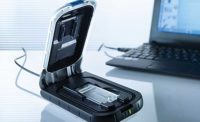Even as the COVID-19 pandemic wanes, manufacturers of medical devices, monitoring systems and personal protection equipment continue their quest to make products that enhance the lives of all patients. High-volume companies, such as UK-based Firstkind Ltd., rely on proven technologies like ultrasonic welding to reach this goal.
Firstkind became acquainted with ultrasonic welding in 2020, to keep up with National Health Service (NHS) demand during the pandemic for the company’s wearable geko therapy device. The NHS purchased thousands of the devices for distribution throughout the UK to healthcare facilities to help recovering patients.
Geko features an embedded neuromuscular electrical stimulation On-Pulse technology platform that stimulates muscles and nerves to help improve flexibility, strength and movement. The device is noninvasive, battery powered, disposable and similar in size to a small wristwatch. Once attached to a patient’s leg, it sends out electrical impluses that reduce the risk of venous thromoembolism, a dangerous blood clot condition suffered by almost one third of seriously ill COVID-19 patients.
On the assembly line, Firstkind uses a dual-head ultrasonic welding station made by Telsonic UK to manufacture the geko devices. The station is fully integrated with pallet automation equipment that is built in-house.
Each head assembly consists of a MAG3512S generator; a precision-adjustable SE3512VF converter module; and a titanium booster mounted to a Telsonic AC450 pneumatic actuator with a titanium single-body sonotrode. The module is also air cooled and spring loaded.
Geko components are made of polypropylene and presented on twin cavity pallets to the twin welding heads. Once activated, the heads simultaneously deliver a controlled staking action so four hollow pins flow into molded recesses at a low force. Weld and hold time are precisely determined by the station’s main PLC.
The welding process joins the front and back of each device, thereby enclosing the internal assembly and sealing the battery in place. To effectively perform this type of welding, Firstkind engineers designed a special pin-and-recess part mold that exactly matches the sonotrode tool face. Little force is needed to stake the assembly.
The manufacturer likes that the ultrasonic welding station produces aesthetically pleasing parts with a tight closure gap. In addition, to ensure patient comfort, the welds are constrained sub-flush within the part recesses. The welds are also strong enough to keep the device tamperproof, while allowing for battery removal via disassembly prior to device recycling.
Another reason Firstkind selected the Telsonic station is the supplier quickly built it, while always adhering to the NHS’s COVID lockdown rules. This included Telsonic UK remotely conducting the factory acceptance test for Firstkind using PC-based visual tools.
The Telsonic MAG generator provides constant power and amplitude across the voltage range from 180 to 260 volts. It also offers high process repeatability, maximum cycle rates through dynamic control, and state-of-the-art fieldbus interfaces. The generator’s space-saving design is optimized for a 300-millimeter-deep switch cabinet.
Located in Bronschhofen, Switzerland, the Telsonic Group has been offering its industrial ultrasonic welders in Europe, America and Asia since 1966. It specializes in plastic and metal welding, as well as ultrasonic cleaning and screening. Worldwide, the company serves customers in automotive, packaging and medical technology.
For more information on ultrasonic welding, call 617-244-0400 or visit www.telsonic.com.





